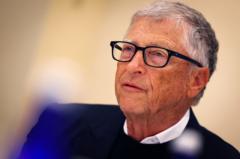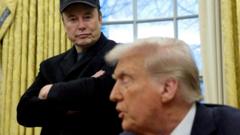Bill Gates has announced a bold plan to give away 99% of his fortune over the next two decades, emphasizing a strong commitment to philanthropy as he sets a target for his foundation to conclude its activities by 2045.
Gates Commits to Donate 99% of His Wealth by 2045

Gates Commits to Donate 99% of His Wealth by 2045
Microsoft co-founder plans to accelerate philanthropic efforts through his foundation, aiming for significant global impact.
In a recent blog post, Bill Gates declared his intention to donate 99% of his remarkable fortune within the next 20 years, expressing a desire to avoid the label of a wealthy individual at his death. The 69-year-old Microsoft founder has already contributed approximately $100 billion towards global health and development initiatives through his foundation and anticipates a further outlay of up to $200 billion over the coming decades, influenced by market conditions and inflation.
Citing Andrew Carnegie's famous 1889 essay, "The Gospel of Wealth," Gates reflected on the responsibility of the wealthy to support societal advancement, echoing Carnegie’s notion that “the man who dies thus rich dies disgraced.” This revised giving strategy marks a shift in Gates' previous plans, where he and ex-wife Melinda aimed for their foundation to remain active long after their lifetimes. The financial commitment could still leave Gates with a substantial fortune, as he is currently among the world’s wealthiest individuals, with a net worth reportedly at $108 billion.
In conjunction with his pledge, Gates emphasized his foundation's focus on eradicating preventable diseases, combating infectious illnesses like malaria and measles, and alleviating poverty for millions worldwide. He expressed concern over recent cuts to foreign aid budgets in the US, UK, and France, cautioning that these actions jeopardize support for vulnerable populations.
Gates did not shy away from criticizing prominent figures such as Elon Musk, holding him accountable for decisions impacting international aid, specifically regarding assistance cuts that affect children's health programs. He urged Musk to witness the consequences of these funding reductions firsthand.
Through his philanthropic mission, Gates seeks to bolster efforts for sustainable growth and health improvements worldwide, determined to ensure his legacy reflects a life dedicated to giving. The Gates Foundation remains a significant contributor in various sectors, and although it has faced criticism regarding its influence and tax implications, it continues to champion global health initiatives.
Citing Andrew Carnegie's famous 1889 essay, "The Gospel of Wealth," Gates reflected on the responsibility of the wealthy to support societal advancement, echoing Carnegie’s notion that “the man who dies thus rich dies disgraced.” This revised giving strategy marks a shift in Gates' previous plans, where he and ex-wife Melinda aimed for their foundation to remain active long after their lifetimes. The financial commitment could still leave Gates with a substantial fortune, as he is currently among the world’s wealthiest individuals, with a net worth reportedly at $108 billion.
In conjunction with his pledge, Gates emphasized his foundation's focus on eradicating preventable diseases, combating infectious illnesses like malaria and measles, and alleviating poverty for millions worldwide. He expressed concern over recent cuts to foreign aid budgets in the US, UK, and France, cautioning that these actions jeopardize support for vulnerable populations.
Gates did not shy away from criticizing prominent figures such as Elon Musk, holding him accountable for decisions impacting international aid, specifically regarding assistance cuts that affect children's health programs. He urged Musk to witness the consequences of these funding reductions firsthand.
Through his philanthropic mission, Gates seeks to bolster efforts for sustainable growth and health improvements worldwide, determined to ensure his legacy reflects a life dedicated to giving. The Gates Foundation remains a significant contributor in various sectors, and although it has faced criticism regarding its influence and tax implications, it continues to champion global health initiatives.



















